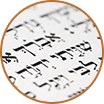 READ MORE
READ MORE
Biblical Hebrew
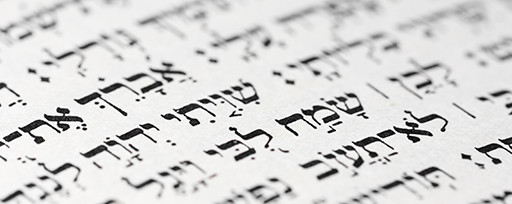
Biblical Hebrew
Discover new depths to the Bible with eTeacher’s online Biblical Hebrew program.The course focuses on reading the Bible in its original language. Over the course of the semester, students learn the Hebrew alphabet and vowels, familiarize themselves with the elementary noun and verbal paradigms, and acquire 450 common Biblical Hebrew words.
Why study Biblical Hebrew?
- Reading the Bible in its original language.
- learning the Hebrew alphabet and vowels and familiarizing with the elementary noun and verbal paradigms.
- Acquiring 450 common Biblical Hebrew words.
Even grammatical topics are taught within the framework of some of the Bible’s most compelling stories. By the end of the term, students will possess a basic vocabulary, be able to read and pronounce all the letters and vowels of the alphabet, and have a working knowledge of the language’s elementary syntactical features. Last but not least, you will acquire a deep sense for the original Hebrew meanings of the Biblical stories.
Biblical Hebrew Academic Director Dr. Ohad Cohen is a linguistics researcher at the
Hebrew University of Jerusalem. Ohad earned an undergraduate and masters degree in Bible and Hebrew Language and wrote his doctoral thesis on the verbal tense system in late Biblical Hebrew prose, all at the Hebrew University. He held a research fellowship at Harvard University’s Department of Near Eastern Languages and Civilizations (NELC).
 READ MORE
READ MORE
Jewish Background of the New Testament

Jewish Background of the New Testament
We will cover a variety of subjects under the broad umbrella of the encounter between Jewish and Christian Studies.
Why study the Jewish Background of the New Testament?
- The course will consider relevant historical, theological, literary and archeological data, enabling the students to read the New Testament in its original context.
- The course adopts a variety of critical, literary but sympathetic, approaches to the NT collection and the ancient literature that will be referred to during the course.
- The course will challenge the students to appreciate the significance of ancient Judaism/s.
Research Professor of Jewish and Christian Studies Dr. Eli Lizorkin-Eyzenberg is an Israeli expert scholar in early and modern Church History. His accumulated knowledge and current research is being used in many spheres of company’s operation. Dr. Lizorkin-Eyzenberg has received a fair amount of Jewish and Christian education both religious and secular.
Hebrew University of Jerusalem.
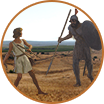 READ MORE
READ MORE
Exploring the Land of the Hebrew Bible
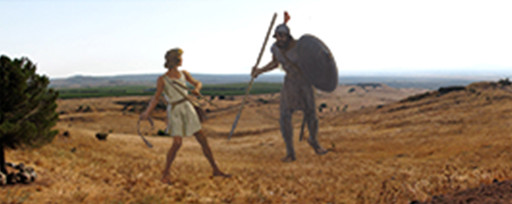
Exploring the Land of the Hebrew Bible
The Bible is a universal text with timeless lessons, but it is also full of specific stories that took place in specific times in specific places. Unfortunately, most readers of the Bible gloss over these seemingly tedious geographical details, presuming that they are unimportant. The central assumption of this course is that geography does matter. The spiritual meaning of the Bible can only emerge once you have thoroughly mastered the literal sense.
Why study the course Exploring the Land of the Hebrew Bible?
- Understanding the impact that location has on the narrative is a major piece of this puzzle.
- This course is designed to provide you with a comprehensive overview of the physical context of the Hebrew Bible.
- We will read ten well-known stories found in the Hebrew Bible, focusing on the crucial role that geography (geology, boundaries, climate, flora, roads, etc.) plays in each narrative.
Scholar in Residence at the eTeacher Biblical Academy Jonathan Lipnick is an educator and tour guide based in Jerusalem, Israel. Originally from the United States, he holds a B.A. in religious studies from Indiana University and M.A.s from Hebrew University and Harvard University. He is currently completing his Ph.D at Harvard in religious studies.
 READ MORE
READ MORE
Biblical Greek

Biblical Greek
Over the course of the semester, students learn the Greek alphabet and its pronunciation, familiarize themselves with the elementary noun and verb paradigms, and acquire a basic vocabulary of words frequently used in these texts.
Why study Biblical Greek?
- Read texts from the original Greek sections
- Get the original meaning of the text
- Learn a language that will enrich your understanding of the Holy Scriptures
Biblical Greek Academic Director Judith Green has been teaching Classical Greek to graduate students at the Hebrew University for decades. Students from Israel, from China, South Korea, Japan, Eastern Europe, Great Britain and many other countries; students who understand that knowing Greek is the key to their study of ancient history, classical archaeology, Jewish and Christian thought and the sacred writings of Jews, Christians and pagans.
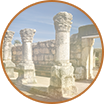 READ MORE
READ MORE
Jewish Gospels and Beyond
Jewish Gospels and Beyond
We will cover a variety of subjects under the broad umbrella of the encounter between Jewish and Christian Studies. The course will consider relevant historical, theological, literary and archeological data, enabling the students to read the New Testament in its original context.
Why study Jewish Gospels and Beyond Course?
- Have a firm grasp of the main historical and theological issues that connect the New Testament and Jewish Studies.
- Know what particular Jewish background literature is of greatest relevancy for New Testament interpretation.
- Achieve a greater personal appreciation of Jewish thought, culture and history and be able to clearly articulate the main ways in which they can and must be used in New Testament interpretation. Additional teaching objectives for graduate students
The course adopts a variety of critical, literary but sympathetic, approaches to the NT collection and the ancient literature that will be referred to during the course. The course will challenge the students to appreciate the significance of ancient Judaism/s.
Research Professor of Jewish and Christian Studies Dr. Eli Lizorkin-Eyzenberg is an Israeli expert scholar in early and modern Church History. His accumulated knowledge and current research is being used in many spheres of company’s operation. Dr. Lizorkin-Eyzenberg has received a fair amount of Jewish and Christian education both religious and secular. Hebrew University of Jerusalem.
Exploring the Land of the Gospels

Exploring the land of the Gospels
It is common knowledge today that Jesus was a Jew. To properly understand his message, we must view Jesus within the context of Second Temple Judaism. Less appreciated is the fact that Jesus was also a Judean. He spent his whole life in the Roman province of Judea, and this physical setting left an indelible imprint on his spiritual message. You will be amazed at how much better you are able to grasp the authentic message of Jesus once you properly understand the social, geographical and political setting of the Gospels.
In this course we will look at some key questions:
- How did the real world where Jesus lived and the people he taught looked like?
- Where exactly are the places mentioned in the Gospels located?
- What items exactly are the parables of Jesus referring to and what has archaeology revealed about the period of Jesus?
Scholar in Residence at the eTeacher Biblical Academy Jonathan Lipnick is an educator and tour guide based in Jerusalem, Israel. Originally from the United States, he holds a B.A. in religious studies from Indiana University and M.A.s from Hebrew University and Harvard University. He is currently completing his Ph.D at Harvard in religious studies.









